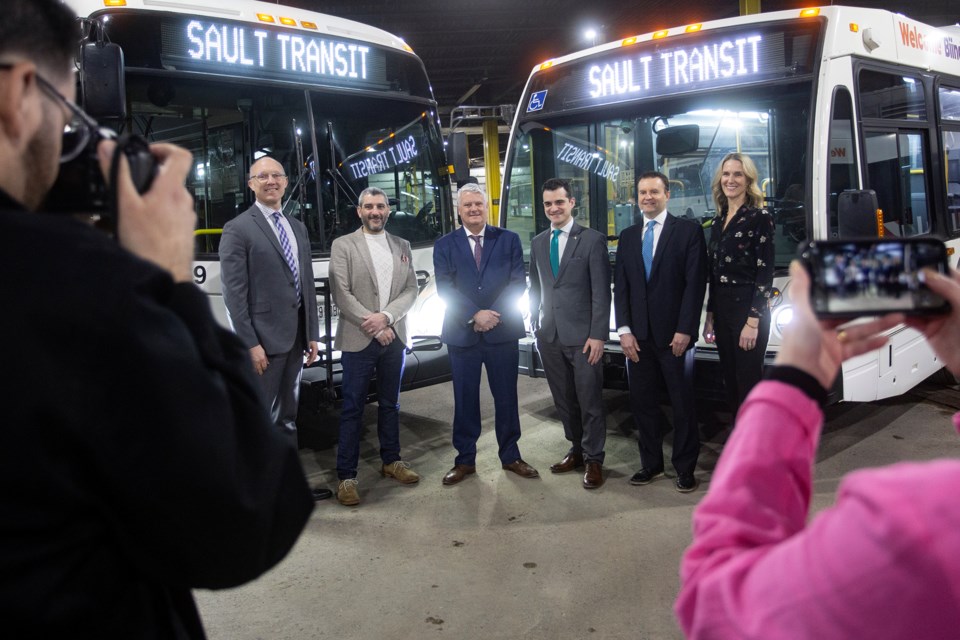Over $7.78 million in total funding from the city, province and federal government was announced on Friday to improve transit infrastructure in the Sault, including the purchase of two electric buses and an electric charging station.
The announcement was made Friday at the Sault Transit bus barns on Huron Street, with Mayor Shoemaker, MPP Ross Romano and MP Terry Sheehan in attendance.
Infrastructure improvements include funding for a major transit hub, along with the purchase of maintenance equipment and service vehicles. Those projects account for about $2.7 million of the overall funding announced Friday.
Over $2.58 million of the funding will go toward the electrification of the transit system, including the purchase of two battery electric buses and a charging station,
The final $2,449,900 will go toward the purchase of new rolling stock, including eight accessible passenger vans, two parabuses and two buses.
"Modernizing public transit is essential to meeting the needs of our community by improving safety and accessibility," said Sheehan in his remarks. "We will enhance the quality of life for all users and, through purchasing environmentally friendly buses, we will reduce air pollution and the amount of money we spend on maintenance."
About $3.1 million of the funding will come from the federal government, with $2.58 being provided by the province. The final $2.09 million will come from the municipal government.
The announcement of the addition of two electric buses will be a first for the Sault Transit fleet.
Brent Lamming, the city's director of Community Services, said these investments are coming at a good time, as ridership numbers are likely to exceed the two million mark for the first time ever in Sault Ste. Marie.
"That has a lot to do with newcomer students and people just taking public transit and using other means as a way to avoid using traditional cars," said Lamming.
The two electric buses will cost more than a traditional diesel bus, said Lamming, but it's hoped they will result in cost savings from reduced maintenance costs and fuel savings. A traditional diesel 40-foot bus costs in the $650,000 to $800,000 range, he said, with an electric bus coming in closer to about $1.1 million.
"The one thing that you do get with electric buses, obviously, there's reduced [greenhouse gases]. You have reduced maintenance costs because you don't have a diesel motor," he said. "You do have to replace the battery approximately every seven years, but net there are some good savings over the years.
Sault Transit and PUC are working together on a study to determine the cost to eventually convert half or all of the buses in the fleet to electric, which would come with additional costs for charging.
"We need a much more significant power source to the building to do that," he said.
As far as the performance of the electric buses in the cold, Lamming said Sault Transit has been watching as other similar communities have been converting to electric.
"The technology is much better than it was before and the new buses are coming out soon to be more more reliable in the cold weather and that's why we're not putting all our money right away," said Lamming.
He noted the Sault was the first northern Ontario community to convert to electric Zambonis for its rinks, and said that has been a success.
With funding is now committed to upgrading a major transit hub, the debate on whether to keep the bus station downtown at Queen and Dennis or move it to Huron Street will begin anew.
Shoemaker told SooToday that the last city council was unable to make a final decision on that debate.
"There there was a split in council during the last term where some portion of council saw the value of moving it to Huron Street and there's, I think, a significant portion of riders wanted it to just stay more central to the downtown core," said Shoemaker.
Lamming noted it is city staff's recommendation that the transit hub move to Huron Street.
"It's been to council many times before and the recommendation, with respect to the consultant, was to have the expansion of the terminal at the location on Huron Street," said Lamming. "That'll be something that will revisit when we go back to council."
In his remarks, Romano said the joint announcement is a good example of all three levels of government working together toward a common goal.
"We are seeing such a change in our demographics here in our community, the growth of our community. It's becomes more and more imperative every day that people can get to places and that there's more effective means for them to be able to do so, so this is good news for the community." he said.
